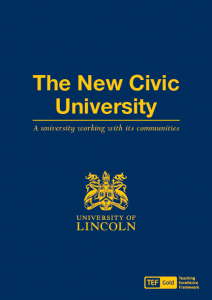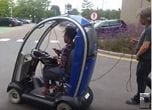
Last week saw the official launch of Rural Visions, the University of Lincoln’s new research group focusing on economic and social geography of rural areas. We began with a discussion about Rural Visions’ role in contributing to Lincoln’s mission to be a New Civic University.
Having been established with the backing of major institutions in Lincoln and Lincolnshire, the University has a responsibility to contribute to economic growth and prosperity, cultural enrichment and social wellbeing across the region, alongside enhancing education and skills.
Although “civic” can denote urban areas, we stress the importance of the wider meaning of the term: “relating to the duties or activities of people in relation to their town, city, or local area.”[1]
For our work to provide a platform for informing activities that sustain a civic mission across the largely rural county of Lincolnshire, we must draw on a blend of international research and local engagement, especially with rural businesses and communities.
At Lincoln, we already have established research centres and institutes covering environmental and climatic threats (Lincoln Centre for Water and Planetary Health), public health (Institute For Health) and innovation in the Agri-food sector (LIAT). Rural Visions focuses on social science, economic and community issues to fill a critical void for the wellbeing of people in our region.
Although we aim to collectively assemble beneath three specific research strands, i.e. Economic Visions, Cultural Visions and Policy Visions, in order to encompass and indicate the vast wealth and range of diverse rural subject areas and research activities, we also acknowledge, appreciate and welcome the vast opportunities for further interaction between and across the strands.
The University is rightly proud of its contribution to supporting economic development. Rural Visions aims to strengthen this further through its “Economic Vision” strand of activities. This includes work to investigate the role of new technologies in creating economic opportunities in the region (e.g. CORA), studies of rural innovation (RUN-IN; SalFar), evaluation projects to influence rural funding initiatives (LEADER) and new research to investigate the role of changing population and migration dynamics across the region (CEERA; Boston).
These projects all draw from local and international dimensions. Working with European partners, the team is advancing theory on Social Innovation in rural areas (Bosworth et al., 2016) and projects from other parts of the UK as well as China are exploring how best to capitalise on rural tourism potential within the limits of sustainability (FeiFei Xu, 2018). Although not always considered “rural”, the significant impact of military land uses in the county, and new uses for redundant sites is another specialist area where the University must continue to play a leading advocacy role (Kipley, 2016).
A common themes across much of this work is the role of the Community – whether as research participants or as enactors of change themselves. As Rural Visions develops, we recognise the importance of building multi-actor networks to ground our activities in the real challenges and needs of local populations. We also aim to showcase our innovative and broad-ranging methods tailored to rural research as these can set us apart from other research teams. This will attract the best postgraduate students and ensure that we can apply the most effective tools and techniques to carry out the research that can make a real difference to rural communities, wherever in the world that research takes place.
Rural Visions’ next event, on 4th April will bring together some short presentations of these innovative rural methods as the starting point from which to build a Rural Research Methods handbook. A full list of our upcoming events is here: https://www.lincoln.ac.uk/home/geography/research/ruralvisions/events/
[1] https://en.oxforddictionaries.com/


